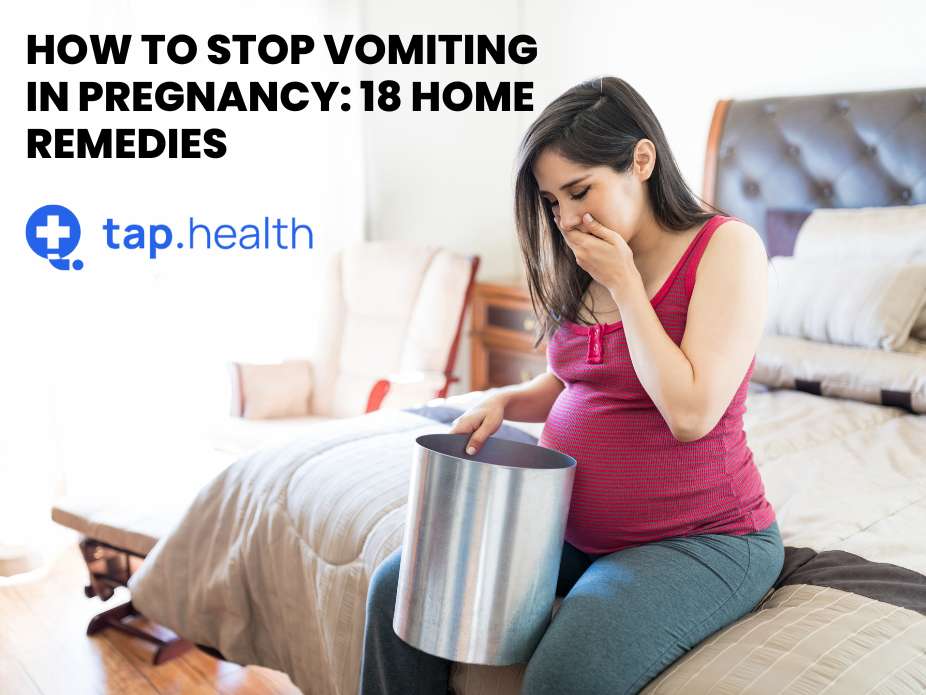Pregnancy is a beautiful journey, but it can come with its share of challenges, including morning sickness. Vomiting during pregnancy is a common experience for many expectant mothers. While it can be uncomfortable, there are several home remedies you can try to help alleviate this symptom. In this blog, we will discuss the causes and symptoms of vomiting during pregnancy, offer 18 effective home remedies, and provide tips on what to eat and medication options if needed.
What Causes Vomiting in Pregnancy?
Vomiting during pregnancy, often referred to as morning sickness, typically occurs due to hormonal changes in the body. Here are some common causes:
- Hormonal Changes: The increase in hormones such as human chorionic gonadotropin (hCG) and estrogen can trigger nausea and vomiting.
- Sensitivity to Smells: Pregnant women often develop a heightened sense of smell, which can make certain odors unbearable, leading to nausea.
- Stress and Fatigue: Physical and emotional stress can contribute to nausea and vomiting.
- Digestive Changes: Pregnancy can slow down the digestive process, causing discomfort and vomiting.
What are the Symptoms of Vomiting in Pregnancy?
Vomiting in pregnancy is usually accompanied by several other symptoms:
- Nausea: A feeling of unease in the stomach often leading to the urge to vomit.
- Food Aversions: Strong dislike for certain foods that previously were not an issue.
- Fatigue: Extreme tiredness and lack of energy.
- Dehydration: Dry mouth, dizziness, and reduced urine output due to frequent vomiting.
18 Home Remedies to Stop Vomiting In Pregnancy
Vomiting during pregnancy, often known as morning sickness, can be a challenging experience. However, various home remedies can help alleviate the symptoms. Here, we explain why each remedy is beneficial, its potential side effects, and how it works in simple terms.
1. Ginger
Why It Should Be Used: Ginger has natural anti-nausea properties and can help settle the stomach.
Benefits: Ginger contains bioactive compounds like gingerol and shogaol, which have anti-inflammatory and antiemetic (anti-vomiting) effects.
Side Effects: Consuming large amounts of ginger can cause heartburn, diarrhea, and stomach discomfort.
2. Peppermint
Why It Should Be Used: Peppermint is known for its calming effect on the stomach muscles and can help reduce nausea.
Benefits: Peppermint contains menthol, which can relax the digestive tract and reduce the urge to vomit.
Side Effects: Peppermint can cause heartburn in some people, especially if taken in large quantities.
3. Lemon
Why It Should Be Used: The citrus scent of lemon can help reduce nausea.
Benefits: Lemon’s fresh scent can help alleviate feelings of nausea and improve digestion.
Side Effects: Overconsumption of lemon can lead to tooth enamel erosion and stomach upset due to its acidity.
4. Crackers
Why It Should Be Used: Eating plain crackers before getting out of bed can help absorb stomach acid.
Benefits: Crackers are bland and easy to digest, helping to settle the stomach and prevent nausea.
Side Effects: Generally safe, but eating too many can lead to an imbalance in your diet.
5. Small, Frequent Meals
Why It Should Be Used: Eating small portions throughout the day prevents the stomach from getting too full or too empty.
Benefits: This can help stabilize blood sugar levels and reduce the likelihood of nausea.
Side Effects: There are no significant side effects, but it’s important to ensure meals are nutritious.
6. Stay Hydrated
Why It Should Be Used: Staying hydrated helps maintain fluid balance and prevent dehydration from vomiting.
Benefits: Drinking water, herbal teas, or clear broths can keep you hydrated and soothe your stomach.
Side Effects: Avoid caffeinated drinks as they can lead to dehydration.
7. Vitamin B6
Why It Should Be Used: Vitamin B6 can help reduce nausea during pregnancy.
Benefits: Studies show that Vitamin B6 supplementation can significantly reduce nausea and vomiting.
Side Effects: Excessive intake can cause nerve damage, so it’s important to follow your doctor’s dosage recommendations.
8. Acupressure Bands
Why It Should Be Used: Acupressure bands apply pressure to specific points on the wrist that can help alleviate nausea.
Benefits: These bands are non-invasive and can be a quick way to reduce symptoms of nausea.
Side Effects: Minimal, but some people may experience discomfort from the pressure.
9. Cold Foods
Why It Should Be Used: Cold foods have less odor than hot foods, which can help reduce nausea.
Benefits: Foods like yogurt, smoothies, and cold fruits are easier to tolerate when feeling nauseous.
Side Effects: Generally safe, but ensure that the food is fresh and properly stored to avoid foodborne illnesses.
10. Avoid Spicy and Fatty Foods
Why It Should Be Used: Spicy and fatty foods can exacerbate nausea and cause digestive discomfort.
Benefits: Sticking to bland, easy-to-digest foods can help keep nausea at bay.
Side Effects: None, as long as you ensure a balanced diet.
11. Rest
Why It Should Be Used: Adequate rest helps combat fatigue and stress, which can worsen nausea.
Benefits: Proper rest helps your body manage pregnancy symptoms more effectively.
Side Effects: None, but ensure you balance rest with light activity.
12. Fresh Air
Why It Should Be Used: Fresh air can help reduce feelings of stuffiness and odors that trigger nausea.
Benefits: Spending time outside or keeping your living space well-ventilated can improve your overall well-being.
Side Effects: None, as long as the air quality is good.
13. Exercise
Why It Should Be Used: Light exercise like walking can improve digestion and reduce stress.
Benefits: Exercise releases endorphins, which can improve your mood and help reduce nausea.
Side Effects: Overexertion can cause fatigue and worsen symptoms, so keep activities light.
14. Apple Cider Vinegar
Why It Should Be Used: Apple cider vinegar can help balance stomach acid levels and improve digestion.
Benefits: Diluting apple cider vinegar in water and sipping it slowly can help settle the stomach.
Side Effects: Drinking undiluted vinegar can damage tooth enamel and irritate the throat and stomach.
15. Caraway Seeds
Why It Should Be Used: Caraway seeds can aid digestion and reduce nausea.
Benefits: Chewing caraway seeds or adding them to food can help soothe the stomach.
Side Effects: Generally safe in small amounts, but excessive consumption can cause digestive discomfort.
16. Fennel Seeds
Why It Should Be Used: Fennel seeds can help relax stomach muscles and reduce nausea.
Benefits: Drinking fennel tea or chewing fennel seeds can alleviate digestive issues.
Side Effects: Fennel is generally safe, but some people may experience mild allergic reactions.
17. Avoid Lying Down After Eating
Why It Should Be Used: Lying down immediately after eating can cause acid reflux and worsen nausea.
Benefits: Waiting at least an hour after eating before lying down can help prevent stomach acid from moving up into the esophagus.
Side Effects: None, just make sure to find a comfortable position while sitting or standing.
18. Stay Cool
Why It Should Be Used: Staying cool can help prevent overheating, which can exacerbate nausea.
Benefits: Using a fan or cool cloths can help maintain a comfortable body temperature and reduce nausea.
Side Effects: None, but ensure you stay warm enough if the environment is cold.
These home remedies offer natural and effective ways to manage vomiting during pregnancy. Always consult your healthcare provider before trying new remedies, especially if your symptoms are severe or persistent.
How Long Does It Take For A Pregnant Woman To Stop Vomiting?
Vomiting in pregnancy is most common during the first trimester. For many women, symptoms improve by the start of the second trimester (around 14 weeks). However
, some women may experience nausea and vomiting throughout their pregnancy. Each pregnancy is different, so the duration and severity of symptoms can vary. It’s important to consult your healthcare provider if you have concerns or if the vomiting is severe.
What to Eat After Vomiting in Pregnancy?
After vomiting, it’s important to ease back into eating gently. Here are some tips on what to eat:
- Clear Fluids: Start with clear fluids like water, herbal teas, or clear broths to rehydrate.
- BRAT Diet: The BRAT diet (Bananas, Rice, Applesauce, Toast) is gentle on the stomach and easy to digest.
- Plain Foods: Gradually introduce plain foods such as plain crackers, rice, boiled potatoes, or oatmeal.
- Electrolyte Drinks: Consider drinks with electrolytes to replenish lost nutrients, but avoid those with high sugar content.
- Soft Fruits: Try soft, bland fruits like applesauce or peeled apples.
- Yogurt: Plain yogurt can be soothing and provide beneficial probiotics for digestion.
- Small Portions: Eat small portions frequently to avoid overwhelming your stomach.
- Avoid Greasy and Spicy Foods: Stick to bland, low-fat foods until your stomach settles.
Medications for Vomiting During Pregnancy
While home remedies can be effective, some women may need medication to manage severe vomiting. Always consult your healthcare provider before taking any medication. Here are some commonly prescribed options:
- Vitamin B6 and Doxylamine: This combination is often recommended as a first-line treatment for morning sickness.
- Antihistamines: Medications like diphenhydramine (Benadryl) can help reduce nausea.
- Antiemetics: Prescription antiemetics such as ondansetron (Zofran) may be used in severe cases.
- Proton Pump Inhibitors (PPIs): For those experiencing severe acid reflux, PPIs can reduce stomach acid and alleviate symptoms.
FAQ on Home Remedies To Stop Vomiting In Pregnancy
1: Is it normal to vomit every day during pregnancy?
A1: Yes, daily vomiting can be normal, especially in the first trimester. However, if it is severe and persistent, consult your healthcare provider.
2: Can vomiting harm my baby?
A2: Occasional vomiting is not likely to harm your baby. However, severe vomiting can lead to dehydration and malnutrition, which can be harmful. Seek medical advice if you are unable to keep any food or fluids down.
3: Are there any foods that can prevent morning sickness?
A3: While no specific food can prevent morning sickness, foods rich in vitamin B6, like bananas, nuts, and seeds, may help reduce symptoms.
4: Can prenatal vitamins cause nausea?
A4: Yes, some women find that prenatal vitamins can cause nausea. Taking them with food or switching to a different brand may help.
Q5: When should I seek medical help for vomiting during pregnancy?
A5: Seek medical help if you experience severe vomiting, dehydration, weight loss, or if you are unable to keep any food or fluids down for more than 24 hours.
Vomiting during pregnancy can be challenging, but these home remedies and tips can help manage your symptoms. Remember to consult with your healthcare provider before trying new treatments or if your symptoms worsen.



